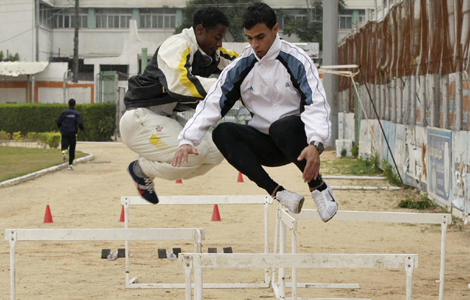Xi defends China on contentious issues
Updated: 2012-02-15 17:02
(Xinhua)
|
|||||||||||
UPHOLDING CHINA'S CORE INTERESTS
Unlike trade, or differences over human rights, the Taiwan issue has been clearly defined by China as one of the country's core interests. The issue serves as the foundation of its foreign policy and should not be tampered with by other countries.
During his meetings with Obama and Biden, Xi, while receptive to US concerns about trade and human rights, stood firm on upholding China's core interests.
Xi reiterated Beijing's position on the Taiwan issue and urged Washington to conform to the spirit of the three joint communiques underpinning China-US relations during his meeting with Obama.
The Obama administration last September notified the US Congress of its decision to sell arms worth 5.85 billion USdollars to Taiwan, including upgrades for 145 of Taiwan's fighter jets.
The move infuriated Beijing and was seen as the latest evidence of Washington's irresponsible nonchalance to China's core interests.
Though not speaking specifically about the arms sale to Taiwan, Xi called on the United States to safeguard, with concrete action, the peaceful development of relations across the Taiwan Strait and the overall development of China-US ties, according to a press release issued by the Chinese delegation.
Xi said the Taiwan issue concerns China's sovereignty and territorial integrity, and remains, as always, the most important and most sensitive issue in China-US relations.
Beijing appreciates Washington's repeated declarations of its commitment to the one-China policy, Xi said.
Obama, for his part, reiterated adherence to the one-China policy based on the three joint communiques.
The United States rejects any calls for "Taiwan independence," he said, adding that his country wants to see the peaceful development of cross-Strait relations move forward.
In talks with Biden, Xi said the Taiwan and Tibet issues concern China's core interests. He asked the United States to properly and cautiously handle those issues so as to avoid damage and disturbances to China-US relations.
SEEKING TO REDUCE STRATEGIC TRUST DEFICIT
Xi's visit has been designed in part to reduced the so-called strategic trust deficit between the world's largest economy and the fastest growing power in the Asia-Pacific region.
Washington has been concerned for years that a rising China might be a destabilizing force by challenging the existing international political and economic order. Beijing, meanwhile, has long feared that America might be seeking to contain its rise.
There is no denying that divergences and disputes between the two countries still exist on many fronts that serve as obstacles in building strategic mutual trust.
During his meeting with Biden, Xi put forward several proposals to promote "strategic mutual trust" between the two countries, including respecting each other's core interests and accommodating each other's major concerns.
"The development of cooperative partnership could be guaranteed only when the two sides view each other's strategic intention and development path in a correct and objective way, respect each other's core interests and accommodate each other's major concerns, avoid making troubles for each other and do not cross over each other's bottom lines," Xi said.
Dialogues between countries' leaders play an efficient role in expounding their foreign policies, removing misunderstanding and thus reducing the strategic trust deficit between the two countries.
Xi proposed that China and the United States should make full use of various dialogue and consultation mechanisms to provide fresh impetus to forging their bilateral cooperative partnership.
Compared with dynamic economic and political interactions between the two countries, China-US military ties are believed to be the weakest link in the complex relationship.
With America shifting more attention and resources back to the Asia-Pacific region with much fanfare, some are worried that the two powers might be in a collision course.
On military relations, Xi noted that efforts should be made to foster and enhance strategic mutual trust between the two countries.
Military relations constitute an important part of the China-US relationship, and therefore need to serve the overall development of China-US cooperative partnership, Xi said during talks with Defense Secretary Leon E. Panetta at the Pentagon.
Xi called on the two nations to make joint efforts to build a sound, stable and mature miliary relationship.
Panetta, for his part, said that the key to promoting the China-US cooperative partnership is the strengthening of mutual trust, further conveying willingness to increase exchanges of high-level visits and build a strong military relationship conducive to their bilateral ties.
Undoubtedly, there are still serious suspicions to be settled before a solid strategic trust can be built between China and the United States.
Xi's words have shown that the suspicions are surmountable. A prosperous China, while creating some major competition for the United States, will not be a threat to America.
Meanwhile, the China-US relationship, widely believed to be the most important in the 21st century, if managed properly, will not only bring significant benefits to the two countries, but also to the entire world.
Washington is the first leg of Xi's five-day visit to the United States. On Wednesday, he will also meet with the speaker of the House of Representatives and Senate majority leader.
Unlike Xi's Washington tour that features serious political talks, the remaining part of his US visit is relatively easy, with a focus on the human touch.
Xi will make a stopover in the Midwestern state of Iowa and revisit the families whom he stayed with on a 1985 visit as a local official in China's northern Hebei province. He wraps up his US visit on Friday in California, where he might watch an NBA game.
Hot Topics
Wu Ying, iPad, Jeremy Lin, Valentine's Day,Real Name,Whitney Houston,Syria,Iranian issue,Sanyan tourism,Giving birth in Hong Kong,Cadmium spill,housing policy
Editor's Picks

|

|

|

|

|

|







